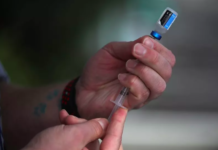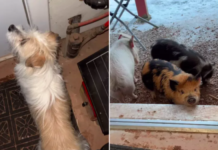Last Updated on September 11, 2021 by Fumipets
When evaluating prospective dog breeds, one of the first things a family typically considers is whether or not they shed. And how much fur can they expect to clean up if they do? If you have allergies, the subject of shedding may be at the top of your checklist.
Does an Aussiedoodle shed? Aussiedoodles, like many other Doodle breeds, are renowned for having little or no shed. While hair may be found in the brush after a brushing session, clumps of hair should not be found everywhere.
The shedding of an Aussiedoodle is comparable to the way we humans lose hair on occasion. They are often referred to as a “non-shedding” breed because the quantity of hair they shed is so little. They are, nevertheless, an allergy-friendly breed.
The Aussiedoodle’s shedding frequency is determined by the coat it inherits. You may reduce shedding even more by keeping your Aussiedoodle healthy and grooming them on a regular basis.
The amount of shedding an Aussiedoodle produces is influenced by a number of factors, including their genetics (or generation) and coat type.
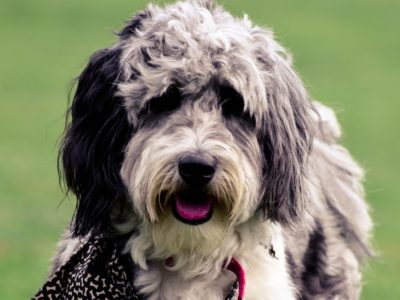
What Effect Does Genetics Have On The Coat Of An Aussiedoodle?
The condition of an Aussiedoodle’s coat, like that of humans, is determined by its parents and ancestry. A Poodle and an Australian Shepard are crossed to create an Aussiedoodle. As a result, it’s critical to examine the coats of both of these breeds. This will assist the owner in determining the coat of their Aussiedoodle.
Curly hair is common in poodles. It has a single coat, which means it does not blow out during specific seasons. Blowing out refers to a dog’s process of shedding its coat. It does this in order to stay cool throughout the summer months. It’s also to aid the dog in getting rid of old hair and making room for fresh.
Poodles do not blow out like other dogs since they only have one coat. Poodles are also often thought to be hypoallergenic. This is a controversial point since no dog is completely hypoallergenic. The Poodle portion of an Aussiedoodle’s genetic pool may be responsible for their coat. If this is the case, the puppy’s hair may be curled.
The puppy’s Australian Shepherd side may possibly play a role. The coat of an Australian Shepherd is twofold. During specific times of the year, they have the ability to puff out their coat.
An Aussiedoodle with a Shepherd side may have curlier hair than a curly Aussiedoodle. Curly hair needs more care and cutting.

Breeding for Desired Traits
The parents are ultimately responsible for the coat and shedding activities of an Aussiedoodle puppy. Breeders may look at the characteristics of previous litters and decide how to more precisely breed for the traits they want by carefully planning selective breeding.
Breeders of Aussiedoodles (and other Doodles such as the Labradoodle and Bernedoodle) would cross an F1 Aussiedoodle (F1 = First Generation = Poodle x Australian Shepherd) with a Standard Poodle to produce puppies that shed even less than the F1. The F1b Aussiedoodle or the first ‘crossback’ is the name given to the resultant litter.
What Are the Different Coat Types of Aussiedoodles?
Wavy and curly coats are available in Aussiedoodles. Their curls are inherited from their Poodle ancestors. Curly hair needs more maintenance than wavy hair.
This is due to the fact that curly hair is more prone to being matted. Brushing a curly-haired Aussiedoodle on a daily basis is recommended. This maintains the curls in good shape and allows them to do what they do best–curl!
The Australian Shepherd side of the genetic pool is responsible for the wavy hair. Although it is longer than curls, it needs less maintenance and combing.
Depending on their dog’s activity, owners should only brush their wavy-haired Aussiedoodles once a week or once every two weeks.
Aussiedoodles have just one coat. Because they don’t have any undercoat to push out, they have a lower risk of blowing their coat out. Their Poodle ancestors gave them a single coat.
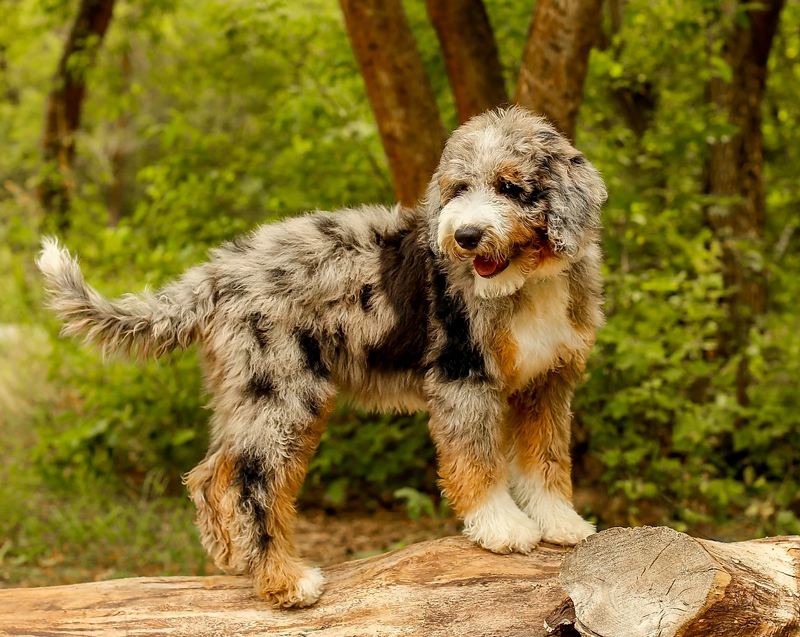
Are Aussiedoodles Hypoallergenic?
Many people are curious about the Aussiedoodle because it is descended from the Poodle, which is believed to be as near to a hypoallergenic dog as you can get. They are not hypoallergenic, to put it simply (no dog truly is). They are more accurately described as “allergy-friendly.”
The Aussiedoodle is highly allergy-friendly because of its low shedding. They shed much less than other dog breeds and mixtures.
Curly-haired Aussiedoodles shed considerably less than wavy-haired Aussiedoodles. If your family suffers from allergies, a curly-haired Aussiedoodle may be a great option.
Grooming Aussiedoodles may also help them become more allergy-friendly. Over time, pollen and grime may accumulate on a dog’s coat. Pollen and grime may be eliminated from their hair by giving them a frequent wash. If they are trimmed on a regular basis, they will most likely shed much less.
Do They Lose Or Blow Out Their Puppy Coat?
Every dog has a puppy coat that has to be blown out. The Aussiedoodle, on the other hand, sheds much less than other dogs. Rather than leaving huge clumps of hair all over the home, the Aussiedoodle may just shed a bit here and there. It makes hair removal simple. It also requires fewer vacuuming sessions.
The most essential thing to ask is if they blow their coat again. They don’t have any. Aussiedoodles do not blow their coats throughout the year, unlike Australian Shepherds.
They have a single coat that does not blow out according to the season thanks to the Poodle in their genetic pool. As a result, most households only notice a modest amount of shedding from their dog throughout the course of the year.
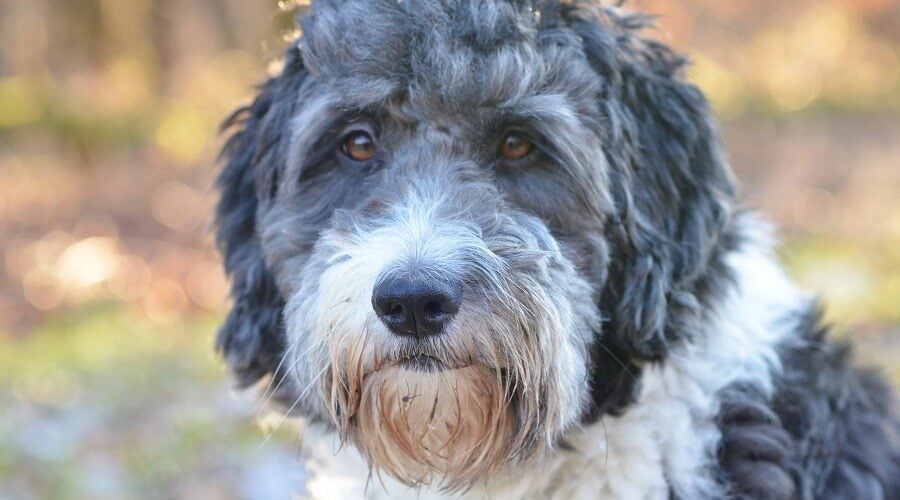
What Can I Do to Reduce Shedding?
There are a few steps that may be done to prevent your Aussiedoodle from shedding as much as possible. Trimming is a fantastic technique. Curly-haired Aussiedoodles will need more trimming than wavy-haired Aussiedoodles.
They should be groomed every two to three months on average. This will not only keep their shedding to a minimum, but it will also decrease the likelihood of their hair matting.
Wavy-haired Aussiedoodles usually need less grooming. Once every three or four months, owners should take them to the groomer. Aussiedoodles that spend a lot of time outdoors will obviously need to be groomed more often than those who spend most of their time indoors. Being outdoors and prone to rolling in the mud and grass may dirty a dog more quickly than rolling about on the carpet in the house.
Brushing is another great way to keep your Aussiedoodle’s shedding to a minimum. Brushing curly-haired dogs on a daily basis is recommended. It maintains the hair clean and smooth while preventing matting. Brushing wavy-haired Aussiedoodles should be done less often.
Once a week, as opposed to once every two weeks, may be just as beneficial. Depending on how much time an owner spends outside, an owner may need to brush their Aussiedoodle more often.
Aussiedoodles that spend the majority of their time–or a significant portion of their time–outside need more brushing than those who spend the most of their time inside.
Last but not least, Aussiedoodles needs scrubbing and cleaning. Bathing should be done once or twice a week for curly-haired coats. Once a month is usually enough for wavy-haired coats.
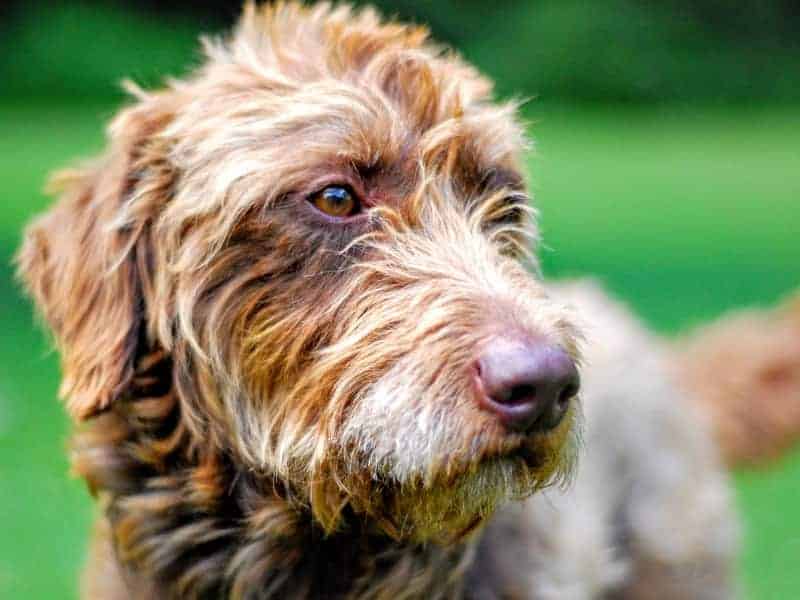
Related Questions
Do Aussiedoodles Need To Be Brushed Often?
Aussiedoodles need to be brushed since they don’t blow their puppy coats. Otherwise, their hair would clump together and mat. Wavy-coated Aussiedoodles need less brushing than curly-coated Aussiedoodles. Brushing wavy coats once a week or every other week is recommended. Brushing curly hair on a daily basis is recommended.
Do Aussiedoodles Mat Easily Like Other Doodle Dog Breeds?
If they are not groomed on a regular basis, Aussiedoodles may quickly mat. Owners should brush and cut their dogs’ coats every two to three months to avoid matting, which may be harmful to the dog. This is particularly true for Aussiedoodles with curly hair. Otherwise, matting will be far more common.


